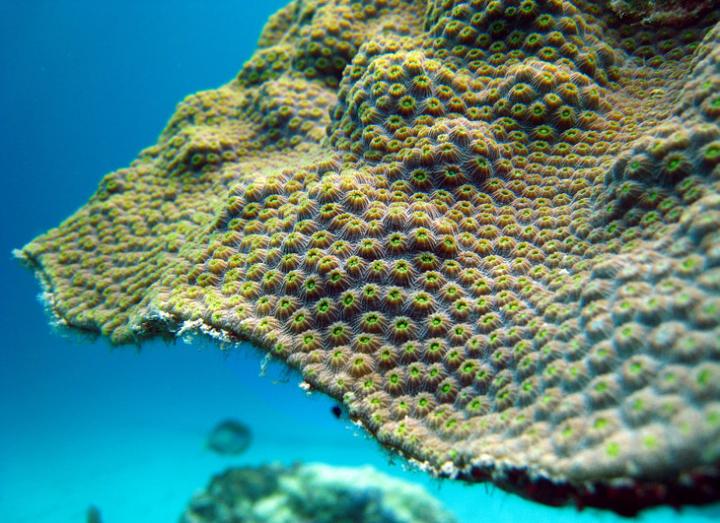Limited access to iron at high temperatures impairs growth and function of microalgae that live within coral cells

Credit: Penn State
How well corals respond to climate change could depend in part on the already scarce amount of iron available in their environment, according to a new study led by Penn State researchers. The study reveals that the combination of hot water temperatures and low iron levels compromises the algae that live within coral cells, suggesting that limited iron levels–which could decline with warming ocean waters–could exacerbate the effects of climate change on corals.
“Corals are the foundation for one of the most important ecosystems in the world,” said Todd LaJeunesse, professor of biology at Penn State. “They support significant amounts of biodiversity, protect our shorelines from storms, provide habitat for our fisheries, and boost our economies with their opportunities for tourism. Climate change affects not only the coral, but also their symbiotic microalgae and the partnership between them. In this study, we explored two aspects of climate change–warming waters and altered amounts of trace metals like iron–on the algae.”
The researchers previously found that the photosynthetic microalgae that live within coral cells–which provide up to 90 % of the coral’s daily nutritional needs through photosynthesis–have very high iron demands.
“In this study, we found that limiting the available iron lowered the heat tolerances of two species of microalgae, which potentially could have cascading effects on the coral and on the reef ecosystem,” said Hannah Reich, a graduate student in biology at Penn State at the time of the research and an author of the study.
In their study, which appears online Sept. 30 in the Journal of Phycology, the researchers investigated the effects of high water temperatures and limited iron availability on the growth of two species of microalgae cultured in the lab–one species typically found in tropical waters and one from more temperate areas. At high temperatures and limited iron, both species grew poorly compared to at moderate temperatures and normal iron levels.
“High temperatures increase metabolic demands, which forces the microalgae to work harder function properly,” said Reich. “It also increases dependence on processes that require iron, like photosynthesis and assimilating other nutrients. We found that under high temperatures, the microalgae needed more than five times as much iron to reach typical, exponential growth rates.”
Limited iron availability at high temperatures also compromised the photosynthetic ability of the algae, reducing their efficiency, which the researchers think contributes to the reduced growth under these conditions. Additionally, warmer temperatures affected the relative amounts of trace metals within the algae, known as their metal profiles.
“These alterations could indicate differences in metal usage, likely affecting the biological functions in which they are used,” said Reich. “Notably, with limited iron, the more tropical species grew better and had less compromised photosynthetic ability at high temperatures and a larger reserve of many trace metals.”
“Our results also highlight that trace metal profiles could be a metric with which to assess heat sensitivity or tolerance among symbiont species,” said LaJeunesse. “Moreover, access to higher concentrations of trace metals may improve a coral’s tolerance of thermal stress.”
In the future, the researchers plan to explore how trace metal requirements change in different conditions in the field, and to explore the impacts of limited iron and warming waters on microalgae living within a host.
“While it is important to understand how access to iron supplies can impact the ability of corals to respond to climate change stressors, there is still a dire need to reduce carbon dioxide emissions to combat the climate crisis,” added Reich.
###
In addition to Reich, now a postdoctoral researcher at the University of Rhode Island, and LaJeunesse, the research team includes Wan-Chen Tu, Irene Rodriguez, Yalan Chou, and Tung-Yuan Ho at Academia Sinica and Elise Keister and Dustin Kemp at the University of Alabama at Birmingham. This study is recognized as the Bold Award feature paper by the journal, who invites the winner of the Harold C Bold Award from the Phycological Society of America annual meeting to contribute a paper. Reich received several other outstanding presentation awards at regional and national scientific meetings for this work.
This research was made possible through the National Science Foundation East Asia and Pacific Summer Institute for U.S. Graduate Students (EAPSI) program. The program allowed Reich to travel to and work with collaborators at Academia Sinica in Taiwan, who had the necessary clean room facilities and expertise working with microalgae to reliably and accurately measure trace metals. Additional funding for this work was provided by the National Science Foundation, the Ministry of Science and Technology of Taiwan, the NASA Pennsylvania Space Grant Consortium, Academia Sinica, and the National Oceanic and Atmospheric Administration.
Media Contact
Gail McCormick
[email protected]
Original Source
https:/
Related Journal Article
http://dx.




